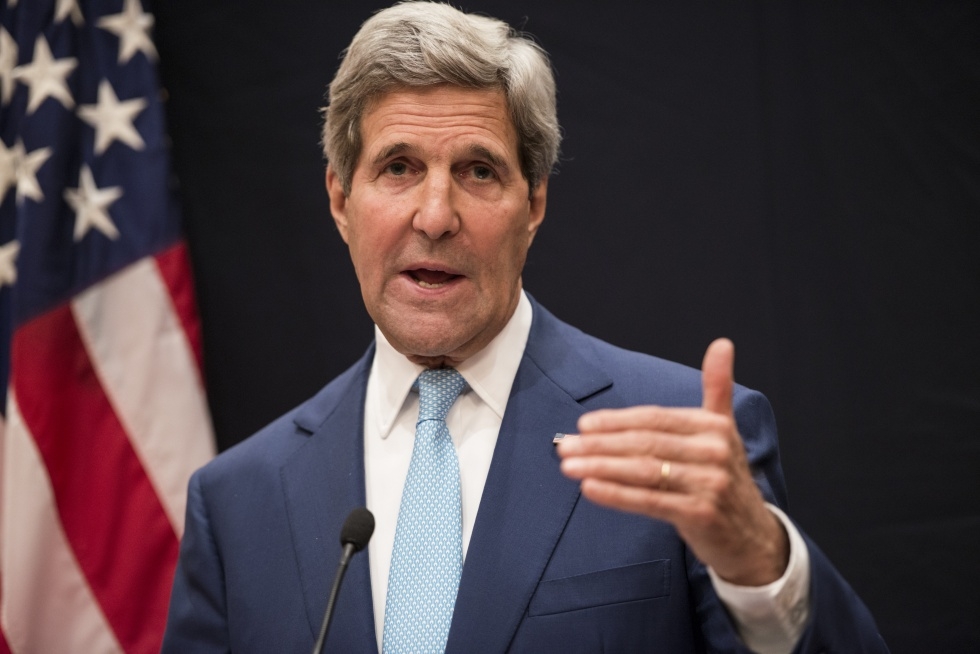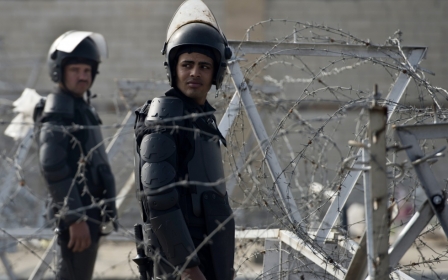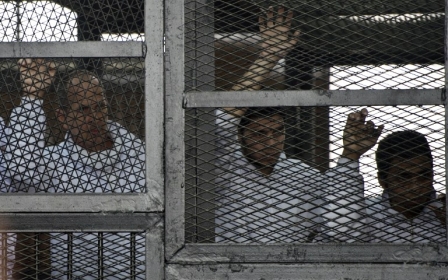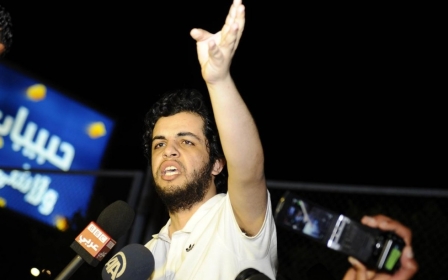Kerry condemns Al Jazeera journalists' sentences as "chilling and draconian"

US Secretary of State John Kerry has condemned the prison sentences handed down to Al Jazeera journalists on Monday,
"Today's conviction is obviously a chilling and draconian sentence," Kerry told journalists on a surprise visit to the Iraqi capital.
The condemnation comes as world leaders react with varying degrees of indignation to the decision by the Egyptian judiciary to convict Mohamed Fahmy, Peter Greste and Baher Mohamed on charges of assisting the banned Muslim Brotherhood and reporting false news.
The three journalists have been on trial for more than four months, with each defendant receiving a minimum of seven years in prison. Fahmy received an additional three-year sentence for possession of ammunition. Six other Al Jazeera journalists were sentenced to 10 years in absentia, while students Anas al-Beltagy and Ahmed Ibrahim, who both say they were tortured in custody were acquitted on Monday.
"The Australian government is shocked at the verdict," said Foreign Minister Julie Bishop of the seven-year sentence imposed on the Australian Peter Greste for aiding the blacklisted Muslim Brotherhood.
"We are deeply dismayed that a sentence has been imposed and appalled at the severity of it. It is hard to credit that the court in this case could have reached this conclusion.
"The Australian government simply cannot understand it based on the evidence that was presented in the case," she added.
EU member Latvia also weighed in as well as Greste is a dual Australian-Latvian national.
"The Foreign Ministry believes that the judicial process has not taken into account all the circumstances relating to Peter Greste's detention, such as the lack of direct evidence," the Latvian foreign ministry said in a press release, adding it "profoundly regretted" the ruling.
The British Foreign Secretary William Hague has also announced that he is summoning Egypt’s ambassador over the convictions.
"I have instructed officials to summon the Egyptian Ambassador to the Foreign and Commonwealth Office today," Hague said in a statement.
But journalists and human rights groups have questioned this reaction, and called on the UK to do more.
The Daily Telegraph columnist Peter Oborne dismissed Hauge’s reaction as a “pathetic” and worded in terms designed not to upset to Saudi Arabia and America.
“We have not been prepared to stand up for the British values of decency, democracy and the rule of law,” he wrote on Monday. “Hague's response to today's announcement has been pathetic. The people sent to jail today were guilty of no crime except journalism.”
Reporters Without Borders secretary-general Christophe Deloire likewise condemned the convictions and the increasingly “totalitarian” nature of the Egyptian government.
“Not content with criminalising all political opposition, the Egyptian authorities are pursuing a policy of gagging news media that try to offer a different take on reality from the government’s,” Deloire said in a statement.
“We point out that such arrests and arbitrary convictions violate the provisions of the new constitution, especially article 71.”
Al Jazeera chief Mustafa Sawaq said in Doha: "We condemn... this kind of unjust verdict. ... We are shocked."
"To have sentenced them defies logic, sense, and any semblance of justice," added Al Jazeera English managing director Al Anstey.
Greste's brother Andrew said he was devastated.
"It is definitely not what we were expecting. I was hoping for acquittal... we will continue to fight for his freedom," he said.
Of the six defendants in custody along with Greste, Fahmy and Mohamed, four were sentenced to seven years and two were acquitted.
"They will pay for this, they will pay for this. I promise!" Fahmy shouted from the dock after the verdict was announced.
The defendants will appeal the decision and many have suggested that the newly-elected President, Abdel Fatah al-Sisi could decide to pardon them as a show of good faith to the international community. However, although a presidential official pointed out to AFP that “a pardon can be given only after the final court ruling.”
Middle East Eye propose une couverture et une analyse indépendantes et incomparables du Moyen-Orient, de l’Afrique du Nord et d’autres régions du monde. Pour en savoir plus sur la reprise de ce contenu et les frais qui s’appliquent, veuillez remplir ce formulaire [en anglais]. Pour en savoir plus sur MEE, cliquez ici [en anglais].




